Half of senior Americans have difficulty sleeping some nights while more than one-third require medication to aid in sleeping. These medications can have several side effects including urinary retention, constipation, and confusion. Other sleep aids may only lengthen sleep by 15 minutes but have other side effects.
To foster better and healthy sleep for seniors, try following these tips.
1. Maintain the same sleep schedule each day. Try to stick to this even on weekends and when traveling. This helps train the body when to go to sleep and when to wake up. Once this has been established, sleep will come more easily and be more consistent.
2. Limit what you drink before bed. This will prevent you from having to get up and use the washroom at night, which can lead to worse sleep.
3. Avoid mid-day naps. This can throw off your sleep schedule and make you feel less tired at night.
4. Put your phone or device away 30 minutes before bed. The blue light emitted from your phone or device restrains melatonin production. This hormone controls your sleep cycle. Phones and devices increase alertness at night while compromising alertness the next morning.
5. If you keep your phone or device in your room, leave it on “do not disturb.” Phone calls, text messages, alerts, and notifications will be silenced so they will not interrupt your sleep.
6. Take a warm shower before going to bed. The drop in body temperature after a shower can help you feel tired and relax, so you are more ready to fall asleep.
7. Don’t use alcohol or caffeine to help you sleep. These can cause you to wake up in the middle of the night when its effects have worn off.
Boom Health provides experienced, in-home caregivers to help care for you or your loved one. Check out the Boom Health app on the App Store or Google Play Store.
Reference: University of Michigan
This article is not intended to be a substitute for professional medical advice or diagnosis. Always seek the advice of your physician or other qualified health provider with any questions you may have regarding a medical condition.





